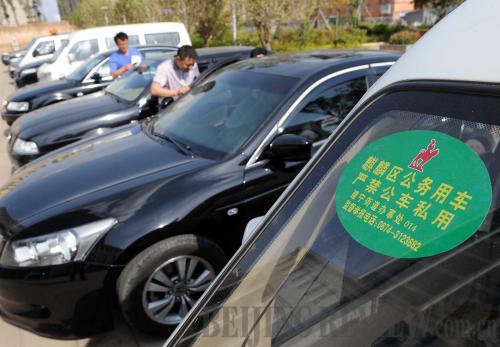|
 |
|
SCRUTINY FACILITATION: Workers with the Jianning Sub-District Office in Qujing City, Yunnan Province, place identification stickers on official vehicles on April 24, a move to prevent them from being used for non-business purposes (YANG ZONGYOU) |
China's Central Government has drawn up a budget of nearly 7.97 billion yuan ($1.29 billion) for official receptions, overseas trips and vehicles in 2013, 126 million yuan ($20 million) less than the amount spent in 2012, following the government's vow to clamp down on extravagance.
On April 18, the Ministry of Finance (MOF) published a document online revealing that the government plans to spend nearly 2.14 billion yuan ($347 million) on overseas trips, around 4.4 billion yuan ($714 million) on government vehicles, and some 1.43 billion yuan ($232 million) on official receptions.
The figures show that spending on public receptions this year will drop the most among the three, which decreased 64 million yuan ($10 million), or 4.3 percent from last year.
The MOF also revealed that departments under the Central Government and organizations that receive public funds spent 8.1 billion yuan ($1.31 billion) on the so-called "three public expenses" in 2012.
"Based on the positive gestures made by the central authority, there is no way this year's spending will go up," said Ye Qing, Deputy Director of the Hubei Provincial Bureau of Statistics and a long-time advocate for reform of the use of government vehicles.
On March 17, Premier Li Keqiang promised that public spending in the cabinet would decrease during his debut press conference after the First Session of the 12th National People's Congress, the country's top legislature.
"It is astonishing that officials spend so much money on vehicles each year. Reform is imminent," Ye said.
In an interview with Xinhua News Agency, Bai Jingming, Deputy Director of the Research Institute for Fiscal Science under the MOF, said that the negative growth in the Central Government's fiscal revenue during the first quarter of this year also reminded the government that it has to "tighten its belt."
"The government should voluntarily cut official spending so as to direct limited fiscal funds to the most needed sectors," Bai said.
According to a statement published by the MOF on April 15, the Central Government collected 1.46 trillion yuan ($237 billion) in fiscal revenue in the first three months of this year, down 0.2 percent year on year.
Leading by example
Gou Yannan, a professor of public finances at the School of International Relations and Public Affairs of Shanghai-based Fudan University, attributes the reduction in central budget on the "three public expenses" to the ongoing efforts to reform the style of governance in China.
On December 4, 2012, the Political Bureau of the Communist Party of China Central Committee announced eight measures at a meeting to reduce extravagance and curb bureaucracy, including an end to lavish receptions, less spending on officials' trips and smaller entourages in overseas visits.
Wang Yukai, a professor at the Chinese Academy of Governance, said the eight requirements aimed at dealing with long-standing complaints from the public.
"They showcased a strong determination of the top leadership to fight chronic and lingering problems within the Party," Wang said.
The Political Bureau's meeting also required disciplinary and auditing authorities to play their role in ensuring the implementation of the eight measures at various levels.
The National Audit Office said in January that it had made a detailed plan to check government departments in order to implement the requirements.
It ordered local authorities to prioritize the auditing of funds appropriated for government departments at all levels for meetings, receptions, overseas trips and vehicle purchases.
The MOF also vowed to keep improving its management of the "three public expenses," make the budget plans of Central Government departments more specific, and strictly control the scale of such budgets.
| 